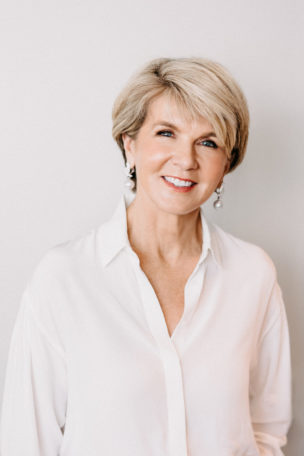Julie Bishop wrote the below extract and foreword in the book The Joy Of Money published by Bauer Books by Kate McCallum and Julia Newbould to appeal to women to ‘to pay close attention to their financial situation’.
Like many women, I have had a complicated relationship with my finances.
I grew up on our family cherry and apple orchard that had been devastated by the Black Sunday bushfires 18 months before I was born. The business did not become profitable again for almost 20 years. My parents were careful with money and my early years were defined by the need to be frugal.
Throughout my teenage years and at university I had a myriad of part time jobs. Thereafter, I was fortunate in my professional careers and achieved financial independence as a young adult. However, this led to a level of complacency and a lack of attention to my savings and investments at crucial times.
Many of my financial decisions were not at the recommendation of a qualified adviser and were often following suggestions from friends, some who had great intentions but little relevant experience. Secondly, proper budgeting was an afterthought, meaning my finances were out of balance at times.

With experience comes wisdom and some of the lessons I learned are in the book, The Joy of Money: The Australian woman’s guide to financial independence.
As the authors Kate McCallum and Julia Newbould point out, it is important for everyone to pay close attention to their financial situation however it is more vital for women.
The Australian Human Rights Commission reports that women currently aged 45-59 have on average far less funds in superannuation than men of a comparable age, with the current average payout from superannuation for women 33% less than for men.

The pay-gap still exists with female full-time workers typically paid 16% less than their male counterparts, while performing the same role.
The Global Gender Gap Report 2018 by the World Economic Forum provides assessments of 149 nations against a 2006 baseline.
One of the interesting findings is that while the global gender gap in education has declined to 4.4%, women still held only 34% of managerial positions in their careers. This has been a feature in Australia for many years, where women are increasingly likely to graduate from university and yet continue to struggle for promotion to senior or executive levels.
It is reported that women spend more than double the hours each week in unpaid work of caring for family and other domestic chores than their male counterparts.
Women also spend more time out of the workforce caring for family.
Julie Bishop
A fascinating but deeply troubling finding of the report is that if current trends are maintained, gender gaps will be eliminated in Western Europe in around 61 years, 70 years in Asia, 74 years in South and Central America, 153 years in the Middle East, 171 years in the Pacific and 165 years in North America. These figures illustrate why women must focus more fully on their finances and to strive for financial independence.
Women must better understand the options and possibilities available to them.
Knowledge is power. In this context, knowledge starts with learning to be financially literate, by seeking out guidance from others with more relevant experience, including obtaining the advice of professionals with expertise in budgeting and investing.
Self-help books can be a great starting point for any woman who is seeking the path to better personal financial management. We should all read the book The Joy Of Money, wherever we may be on that path.

Available now where all good books are sold and at www.bauerbooks.com.au
The Carousel would like to thank Bauer Books for allowing us to publish the foreword by Julie Bishop, former MP and Deputy Leader of the Liberal Party, in the new book The Joy Of Money by Kate McCallum and Julia Newbould.
And a message from us to our readers, this book really is a must read for all women as it will help give them independence and put them in charge of their own destiny.







